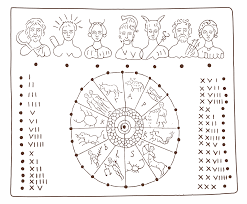Kalendarz Grecki

Wszelkie rekordy bałaganu, związane z kalendarzem opartym na roku księżycowym, pobili jednak Grecy.-Kalendarz przejęli od Babilończyków. Nie bardzo wiemy kiedy. W każdym razie znany był w Grecji już na początku I tysiąclecia p.n.e. Ale Grecy nie stworzyli jednolitego systemu kalendarzowego dla całej Hellady: w poszczególnych miastach-państwach greckich istniały różne kalendarze. Różne też były nazwy miesięcy, inny sposób uzgadniania systemu słonecznego z księżycowym, inny początek roku, a nawet inny „punkt wyjściowy” rachuby lat. Kalendarzowy rok ateński rozpoczynał się mniej więcej w połowie lipca i z początku składał się z 12 miesięcy liczących po 30 dni. Obejmował więc 360 dni. Następnie ograniczono ilość dni, wprowadzając również miesiące 29-dniowe, które występowały na przemian z 30-dniowymi. Dla wyrównania różnicy między rokiem księżycowym a słonecznym wprowadzano co kilka lat dodatkowy, trzynasty miesiąc. Przyjęto cykl 8-letni, w którym rok III, V i .VIII miał 13 miesięcy i liczył 384 dni, pozostałe zaś lata — mające po 12 miesięcy — liczyły po 354 dni.
W 432 r. p.n.e. dokonano nowej reformy. Jej autorem był matematyk i astronom ateński, Meton. Trzynasty miesiąc występował teraz w cyklu 19-letnim: w roku III, V, VIII, XI, XIII, XVI i XIX. W 330 r. p.n.e. Kal-lipos z Kyzikos ułożył cykl kalendarzowy, obejmujący 76 lat. Wprowadził do niego poprawki w 145 r. p.n.e. Hipparch. Reform i poprawek kalendarzowych było więc wiele, aż wreszcie sami Ateńczycy zgubili się we własnej chronologii, nie mówiąc o późniejszych historykach. Biorąc zaś pod uwagę fakt, że inne miasta-państwa miały inne systemy kalendarzowe… przeliczenia lat stały się niezmiernie trudne, jeśli w ogóle możliwe.
Ateńczycy nie numerowali lat. Każdy rok określano imieniem, urzędującego archonta-eponyma. Pisano: „za archonta”, „kiedy archontem był”… W Sparcie określano lata podobnie — według urzędującego efora-eponyma.
W IV w. p.n.e. podjęto próby określenia daty zdobycia Troi. Ryło to ważne wydarzenie dla wszystkich Greków, słusznie więc uznano, że powinno stać się początkiem „greckiej ery”, tj. punktem wyjściowym dla chronologii. Niestety, badania trwające aż dwa wieki skończyły się niepowodzeniem. To znaczy: jedno z ustaleń było bezbłędne (rok 1183 p.n.e.), ale… nikt w ówczesnej Grecji nie był tego pewien.
W III w. p.n.e. historyk Timajos z Tauromenion (ok. 352—260 p.n.e.) wprowadził do literatury „erę olimpijską”, tzn. obliczanie czasu według olimpiad, 4-letnich okresów między igrzyskami olimpijskimi. Punktem wyjścia były pierwsze igrzyska, które (według naszych przeliczeń) odbywały się w 776 r. p.n.e. Daty określano podając kolejne czterolecie, czyli olimpiadę, i rok w obrębie danej olimpiady. Np. rok 772 p.n.e. — rok pierwszy 2 olimpiady, rok 753 p.n.e. — rok czwarty 6 olimpiady, rok 232 p.n.e. — rok pierwszy 137 olimpiady, itp.
W Koryncie datowano według 2-letnich istmiad, które dzieliły igrzyska olimpijskie. W Delfach — według pytiad (igrzyska pytyjskie odbywały się, podobnie jak olimpijskie, co 4 lata, w trzecim roku olimpiady). Ze względu jednak na panhelleński charakter igrzysk olimpijskich najbardziej rozpowszechnione było datowanie według olimpiad. Była to jednak… „era literacka”. Urzędowo datowano w Atenach po staremu, według nazwisk archontów, w Sparcie zaś — według nazwisk eforów.
W okresie hellenistycznym na greckim wschodzie przyjęło się jednak datowanie według „ery Seleucydów” (podobnie jak u Żydów). Używano też „ery bityńskiej”, której początek przypadał na 298/297 r. p.n.e., kiedy zaś Grecja — jako Achaja — stała się prowincją rzymską (146 p.n.e.), wprowadzono „erę achajską”. Obowiązywała ona od 145/144 r. p.n.e. Omówienie szczegółowe kalendarzy greckich jest niemożliwe. Każde miasto-państwo miało inny kalendarz. Wystarczy powiedzieć, że pierwszym miesiącem kalendarzowego roku ateńskiego był Hekatombaion (lipiec-sierpień), w Beocji — Bukatios (grudzień-styczeń), w Etolii — Prokoklios (wrzesień-październik), w Tesalii — Itonios (sierpień-wrzesień), a na Rodos — Thesmophorios (październik-listopad). Również nazwy miesięcy były do siebie niepodobne. Oto kilka przykładów:
| W Atenach | W Delfach | W Tesalii | Odpowiedniki
naszych |
| Hekatombaion | Apellaios | Phyllikos | VII-VIII |
| Metageitnion | Bukatios | Itonios | VII-IX |
| Boedromion | Boathoos | Panemos | IX-X |
| Pyanepsion | Heraios | Themistios | X-XI |
| Maimakterion | Daidophorios | Agagylios | XI-XII |
| Poseideon | Poitropios | Hermaios | XII- I |
| Gamelion | Amalios | Apollonios | I-II |
| Anthesterion | Bysios | Leschanorios | II-III |
| Elaphebolion | Theoxenios | Aphrios | III-IV |
| Munychion | Endyspoitropios | Thyios | IV-V |
| Thargelion | Herakleios | Homolon | V-VI |
| Skirophorion | Iliaios | Hippodromios | VI-VII |
Rzecz oczywista, inne także były święta (religijne i państwowe), obchodzone w różnych terminach.
